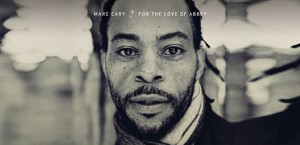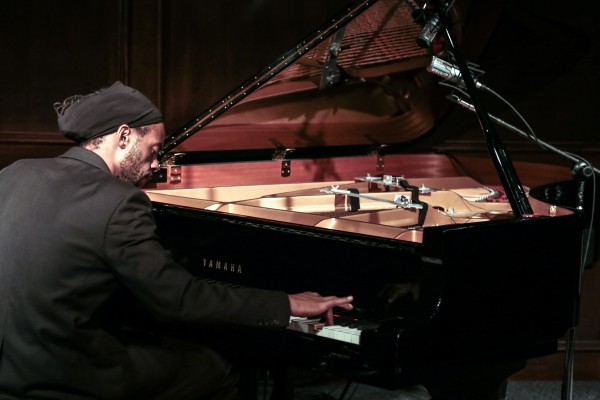Fuse Jazz Review: Pianist Marc Cary — A Virtuoso Yarnspinner
Marc Cary, solo piano. At Scullers’s, Cambridge, MA, August 30.
By Michael Ullman.
Starting in the mid ’90s, pianist Marc Cary, who was born in 1967, spent over a decade accompanying singer/actress Abbey Lincoln. With exquisite timing and wrenching turns of voice, Lincoln sang songs of protest and celebration. Somehow she always sounded more articulate than other singers. It was obvious, from her initial 1959 recording of Afro Blue, that lyrics mattered deeply to Lincoln. When she delivers the line “what are you doing for the rest of your life,” it sounds like an urgent invitation call for self-examination. She was more than a superb vocalist. Decades ago, Thelonious Monk said Lincoln was “a gifted composer and writer.” It has taken Marc Cary’s new CD, For the Love of Abbey (Motema), to draw welcome attention to her considerable accomplishments as a composer.
Cary came to Sculler’s to play Abbey Lincoln. He spoke of what he learned from her, in terms of spiritual as well as musical values. Then he demonstrated his remarkable ability to play in a style that is both pianistic and ingeniously verbal—somehow he suggests that a tune’s lyrics are running through his head. His is a bold, broad, full-bodied (at times bombastic) style, with powerful bass ostinatos and equally powerful left hand tremolos. He is a flamboyant, even clangorous, performer.
At one point during his performance of the composition “My Life is You,” Cary ran the back of his fist up the black keys of the piano. (I deduce the piece was then in the key of F#.) At other times, he is just as likely to let the bottom fall out, suddenly playing a melody innocently in thirds high up in the treble, as he did with Lincoln’s “Another World.” Cary said afterwards that in her music Lincoln had “tapped into” other, presumably spiritual, worlds, and that his airy treble passages were meant to suggest them. He called her “Down Here Below” a particularly complex piece: “I’ll try to express it in different ways.” For Cary, it is apparently addressed to a Higher Power, exploring the sorrows and scars of living on earth, down here below. He emphasizes the line “They say I’ll never see your face/ and we’re banished from your grace.” He introduced the tune in his bold, bass-heavy way but in mid-improvisation played an innocent, almost childish, version of the melody. Then Cary brought in a rumbling tremolo before letting the piece fade away.
Cary mostly stuck to tunes found on For the Love of Abbey, including his own composition “For Moseka.” A welcome addition was Lincoln’s “Caged Bird.” (Her favorite recorded version is found on Golden Lady.) The tune very much exemplifies the performer’s credo that “life can be so restrictive if you don’t have self expression…..It’s natural for the human spirit to dance and sing, to play an instrument, to tell stories.” In Cary, Lincoln has found a powerful kindred spirit: he is a virtuoso instrumentalist whose technique is flexible enough to spin out stories filled with passion. Lincoln’s tune “Conversations with a Baby,” Cary told us, particularly resonates with him now because he has recently become a grandfather. His own father was present at Sculler’s—through the music they seemed to be celebrating together.
Michael Ullman studied classical clarinet and was educated at Harvard, the University of Chicago, and the U. of Michigan, from which he received a PhD in English. The author or co-author of two books on jazz, he has written on jazz and classical music for The Atlantic Monthly, The New Republic, High Fidelity, Stereophile, The Boston Phoenix, The Boston Globe and other venues. His articles on Dickens, Joyce, Kipling, and others have appeared in academic journals. For over 20 years, he has written a bi-monthly jazz column for Fanfare Magazine, for which he also reviews classical music. At Tufts University, he teaches mostly modernist writers in the English Department and jazz and blues history in the Music Department. He plays piano badly.


